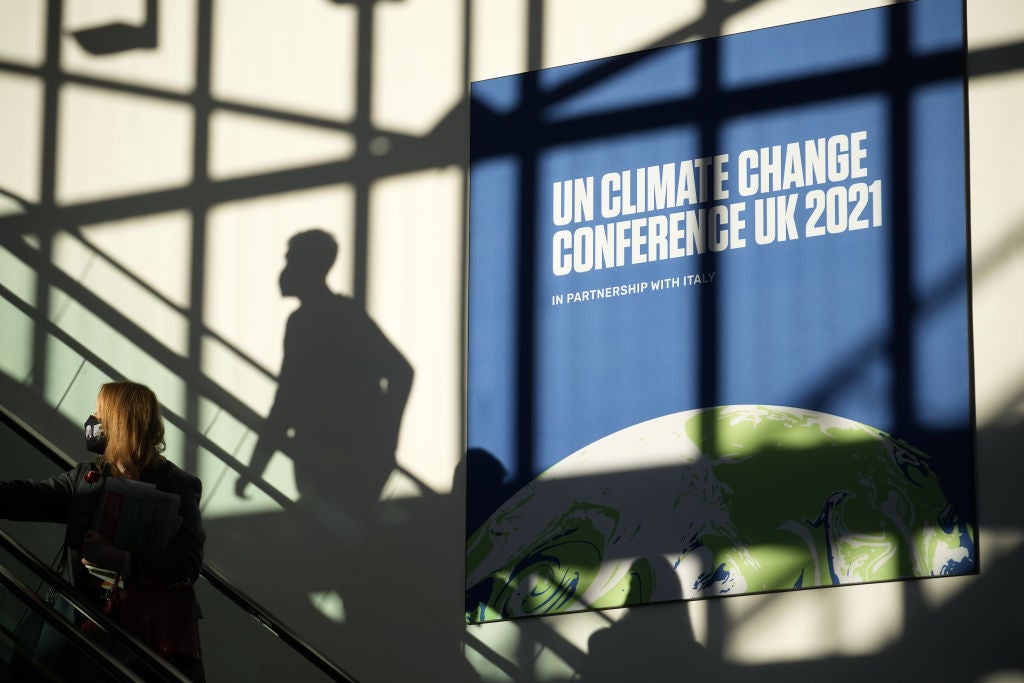Who carries more influence: the head of a global bank or the premier of a poor country?
As someone said, Cop26 is like a party conference on steroids, but it is the bankers who have what the politicians and environmentalists lack, money, writes Chris Blackhurst


Among the stars of Cop26 are the senior bankers and financiers. They’ve made it their business to journey to Glasgow and to be seen trying to save the world.
Of course, as well, there is serious networking to be had, possibly even new opportunities to be explored. As one PR man said, the climate change gathering is like “party conference on steroids”. Make that Davos where the World Economic Forum (WEF) holds its annual meeting. It’s the place to go, to have your entourage trailing behind, as you rub shoulders with world leaders and senior figures.
They’ve found a receptive audience. The bankers and investment fund managers have something the politicians and environmentalists lack. Money. Who do you suppose carries more influence: the head of a global bank or the premier of a poor country?
Sure enough, one of the most eye-catching stories from Cop26 so far has been the pledge by more than 450 of the world’s biggest banks and pension funds that by 2050 all the assets under their management will be aligned with net zero targets. As for the figure they’re talking about they currently have $130trn (£960bn) under management. $130trn! All hail the financial titans.
No matter that they continue, some of them, to pump cash into extracting fossil fuels. Let’s not get into hair-splitting either by pointing out it’s not clear what exactly is covered by the pledge and what is excluded – possibly enabling the signatories to carry on with at least some of their decidedly non-environmentally friendly activities.
It can’t be lost on the delegates that while the bank chiefs are treated like superstars, elsewhere in Glasgow activists are picketing their buildings. That’s not how to behave towards someone who has just gone out of their way to accommodate you except if, in the eyes of the demonstrators, they haven’t.
Being negative at times like this is churlish, as those who work for our boosterish Prime Minister well know. We love bankers, we do. Have you got that?
Here is Mark Carney no less, the former Bank of England governor and now a UK and United Nations climate envoy: “The architecture of the global financial system has been transformed to deliver net zero. We now have the essential plumbing in place to move climate change from the fringes to the forefront of finance so that every financial decision takes climate change into account… [This] rapid, and large-scale, increase in capital commitment to net zero… makes the transition to a 1.5C world possible.” Where’s the graffiti spray paint: bankers are brilliant.
Before bankers and their fund manager ilk can truly be considered good citizens of the world, they need to alter their ways
While they were preening themselves about what wonderful people they are, however, there has been another development that should give us, and them, pause. Violation Tracker has come to the UK.
What’s Violation Tracker? It’s the website that, as the name suggests, tracks the fines handed out by public agencies and the courts to big companies. Americans have had access to its database for five years, now it’s arrived in the UK. Violation Tracker UK will collate enforcement actions brought against companies by government regulators in England, Scotland, Wales and Northern Ireland. Already, it contains more than 63,000 cases involving issues such as financial misconduct, workplace abuses, environmental offences and anti-competitive practices.
Modelled on the US Violation Tracker, the UK version combines cases resolved since 2010 from 40 regulatory agencies. It’s produced by the Corporate Research Project of Good Jobs First, a Washington DC non-governmental organisation.
“We hope that Violation Tracker UK will, like its US counterpart, be helpful to a wide range of users, especially those seeking to reform corporate behaviour,” says Philip Mattera, the director at Good Jobs First Research, who leads the work on the database.
Using a proprietary matching system, Violation Tracker UK shows which of the individual penalties in the database were imposed on subsidiaries of large parent corporations. The holdings of more than 650 parents, including both publicly traded and privately held companies based in the UK or abroad, are captured. FTSE 100 companies and their subsidiaries account for more than one-quarter of the £11.9bn in penalties documented in the database.
Due mainly to a £991m bribery settlement with the Serious Fraud Office (SFO) last year, the company with the largest penalty total (a little over £1bn) is Airbus. It is followed by the now-defunct Nortel Networks, which in 2017 reached a settlement with the Pensions Regulator worth an estimated £1bn. Next are Barclays (£515m), Rolls-Royce (£510m) and Lloyds (£467m).
It’s early days for the UK, but there is the beginning of a pattern: financial services groups account for £4.5bn in penalties, followed by aerospace at £1.6bn and telecoms with £1.2bn.
Guess what, it’s the same as in the US. There, banks and other financial firms stand out: in the 20 years covered by the US database they have been penalised a total of $324bn (£240bn) – more than seven times the next most-penalised industry, oil and gas. Transgressions by the banks and finance companies include mortgage fraud, money laundering, consumer and investor abuses, tax violations, interest-rate manipulation, and more.
Before bankers and their fund manager ilk can truly be considered good citizens of the world, they need to alter their ways. They cannot give on the one hand and take on the other; acts of beneficence and glad-handing are not enough.




Join our commenting forum
Join thought-provoking conversations, follow other Independent readers and see their replies
Comments